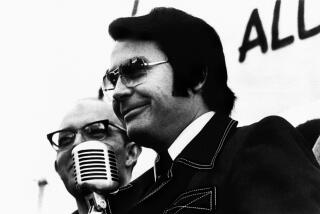Waco Case Tests Boundaries of Religious Liberty : Rights: Some say government targeted Davidians with such firepower because agents viewed them as a cult.
- Share via
WASHINGTON, D.C. — Congressional hearings on the Branch Davidian siege are raising thorny questions about whether the government owes unconventional and insular religious sects as much religious freedom as that granted more mainstream faiths.
Many religion scholars see the Waco case as a colossal government failure to balance a group’s 1st Amendment rights to practice its faith freely with the government’s imperative to intervene when it suspects laws are being broken.
At Waco, law enforcement officials saw sect leader David Koresh as a criminal. But his followers saw a prophet whose penchant for stocking guns and taking multiple, mostly teen-age “wives” was biblically justified. Where the FBI saw hostages, the Branch Davidians saw themselves as willing disciples graced by God.
“Religious freedom and religious liberty do not mean that any group is exempt from obeying laws that are already on the books,” said J. Phillip Arnold, a scholar at the Reunion Institute in Houston. “But the government doesn’t have a right to oppress people because their religious faith is different from the mainstream.”
Religious liberty’s boundaries are likely to be tested even more in coming years as the approaching millennium prompts some apocalyptic sects to act out their end-time scenarios, religion scholars say.
The last year has provided two chilling examples of the potential dangers of unorthodox religious movements: In Japan, the Aum Supreme Truth sect’s leader and about 40 members have been charged with murder for poison gas attacks in the Tokyo subway system that resulted in 12 deaths. In Switzerland and Quebec, 53 people involved with a shadowy group called the Order of the Solar Temple were found dead in village chalets late last year, the victims of a still-unsolved mass murder-suicide.
*
In the United States, the Branch Davidians were only the most recent in a long line of experimental religious movements mistrusted by their neighbors and badgered by the government, scholars say. The “cults” of centuries past are today’s accepted religions by virtue of longevity and adaptability.
The Mormons also stockpiled weapons and practiced polygamy in the 19th Century and were evicted from one settlement after another until they found a home in Utah. Christian Scientists weathered a series of court cases challenging their right to practice spiritual healing when the public model was medical healing.
“If you look at the record of American religious history, it’s quite clear that there is a kind of gradation of tolerance,” said Catherine L. Albanese, professor of religious studies at UC Santa Barbara.
“Groups that are most like the public Protestantism that informed the founders of the nation are the most tolerated, and as groups get further and further away from looking and acting and behaving like Protestants, they become less and less tolerable.”
Experts in church-state relations agree that a group’s claims to religiosity do not offer any protection if it is breaking the law. But in the Waco situation, some religion scholars suspect that federal agents targeted the Branch Davidians with such firepower and ferocity because they viewed the group as a fanatical cult of brainwashed believers willing to go to war with government troops on orders from a maniacal guru.
*
Many modern sociologists and religious historians eschew the term cult because they say it is pejorative and implies that participants are mind-control victims. Instead, they see such groups as “new religious movements” of like-minded believers who join of their own free will.
Branch Davidian member Myrtle Riddle, whose son Jimmy died in the raid on the compound, said in an interview last week: “We weren’t there against our will. We’re very independent people and we think for ourselves. We came and went as we pleased. David [Koresh] didn’t have control over our lives.”
The FBI “sent a hostage team,” Riddle said, “and there were no hostages in there.”
In a critical report to the Justice and Treasury departments after the raid, Nancy T. Ammerman, a sociologist of religion at Hartford Seminary, said the Bureau of Alcohol, Tobacco and Firearms and the FBI should have understood that many religious movements--new and old--ask their members for total commitment.
“We have seen many religious groups in our history that have stretched the bounds of what people were willing to tolerate sexually,” Ammerman said.
The Mormons were polygamous, the Oneidas didn’t recognize marriage, the Rajneeshis practiced free love, and the Roman Catholics demand priestly celibacy, she said.
But what should government do when a self-proclaimed prophet claims a religious rationale for having sex with minors--a practice secular society has judged to be both immoral and illegal?
Fourteen-year-old Kiri Jewell testified last week that she was 10 when Koresh had sex with her. Her testimony was a shocking reminder of the government’s initial rationale for the raid.
More to Read
Sign up for Essential California
The most important California stories and recommendations in your inbox every morning.
You may occasionally receive promotional content from the Los Angeles Times.













